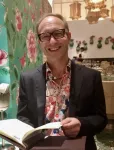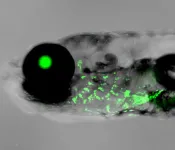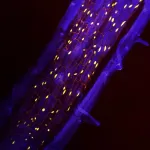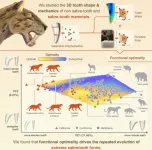Professor Charles Schencking, Professor of History of the Faculty of Arts at the University of Hong Kong (HKU), has been elected as a Corresponding Fellow of the Australian Academy of Humanities (the Academy).
The Australian Academy of the Humanities was established in 1969 by Royal Charter to advance knowledge of, and the pursuit of excellence in, the Humanities. It is an independent, not-for-profit organisation with a Fellowship of over 730 distinguished humanities researchers, leaders, and practitioners from around Australia and overseas, and it is one of Australia’s five Learned Academies – independent organisations established to encourage excellence in their respective fields and to provide expertise and advice at public, institutional and government levels.
As described by the Academy, “The Academy’s new Fellows represent those who have left an indelible mark on their field, and a ground breaking contribution to our understanding of societies and cultures. Election to the Academy is the highest honour within the humanities in Australia.” President of the Academy Professor Stephen Garton AM FAHA FRAHS FASSA FRSN said. “Each of our Fellows are working at the forefront of issues of national and international importance and exemplify why ethical, historical, creative and cultural knowledge and expertise is critical to better decision making for a resilient society.”
Fellows, Honorary Fellows, and Corresponding Fellows are elected in recognition of the excellence, leadership and impact of their work in disciplinary fields or in recognition of their contribution to the public humanities and the cultural and creative life of the nation. Corresponding Fellows are elected in recognition of their outstanding contribution in a humanities discipline, but not usually residing in Australia.
Professor Charles Schencking is among the five outstanding researchers elected as Corresponding Fellows this year with expertise in digital humanities, Islamic Studies, Asian Studies, and linguistics, who will link the Academy to new opportunities for collaboration across the United States, Germany, the United Kingdom, Taiwan and Mainland China.
The Academy praised Professor Schencking as “a leading, highly respected and productive historian of modern Japan with deep connections to the Australian scholarly community and strong interests in promoting the Humanities.”
“It is a wonderful honor to be elected to this esteemed academy,” Professor Schencking said. “History is the discipline that best enables me to understand humanity,” he added, and he continually strives to convey this through his research, teaching, and postgraduate supervision.
Professor Schencking is a historian of modern Japan who has published widely on the 1923 Great Kantō Earthquake, the Japanese navy, natural hazards, Japanese-American relations, and war, state, and society. His research and teaching are both heavily influenced by exploring the interplay between politics, technology, environment, and society. He has adopted a research-led teaching approach to his undergraduate portfolio and his teaching seeks to empower students to develop and articulate original, evidence-based ideas and opinions about the past in clear, concise, and persuasive ways.
Professor Charles Schencking began his academic career at the University of Melbourne and before that was a British Academy postdoctoral fellow at Cambridge University, and a Yasuda Banking and Trust fellow. He has held distinguished visiting appointments at the University of Tokyo, Rikkyō University, the University of Kyoto, and Murdoch University. Over the course of his career, Professor Schencking has secured generous research funding from the British Academy, the United States National Endowment for the Humanities, the Australian Research Council, the Hong Kong Research Grants Council, and the Japan Foundation. He has been awarded prizes for research and teaching, most notably the Award for Australian University Teaching Excellence, Early Career Category from the Carrick Institute for Learning and Teaching Excellence in Australian Higher Education.
To view the announcement of the Australian Academy of Humanities: https://humanities.org.au/power-of-the-humanities/academy-humanities-announces-fellows/
For media enquiries, please contact Ms. Agatha Fung, Development and Communications team, Faculty of Arts, HKU (E-mail: agathaf@hku.hk).
END
HKU Faculty of Arts Professor Charles Schencking elected as Corresponding Fellow of the Australian Academy of Humanities
2025-01-09
(Press-News.org)
ELSE PRESS RELEASES FROM THIS DATE:
Rise in post-birth blood pressure in Asian, Black, and Hispanic women linked to microaggressions
2025-01-09
A study of more than 400 Asian, Black and Hispanic women who had recently given birth found that racism through microaggressions may be linked to higher blood pressure during the period after their baby was born, according to a new study by Columbia University Mailman School of Public Health. More than one-third of the mothers reported experiencing at least one microaggression related to being a woman of color during or after their pregnancy. The research conducted with colleagues at the University of Pennsylvania ...
Weight changes and heart failure risk after breast cancer development
2025-01-09
About The Study: In this nationwide cohort study in the Republic of Korea, postdiagnosis weight gain was associated with an increased risk of heart failure after breast cancer development, with risk escalating alongside greater weight gain. The findings underscore the importance of effective weight intervention in the oncological care of patients with breast cancer, particularly within the first few years after diagnosis, to protect cardiovascular health.
Corresponding Author: To contact the corresponding author, Dong Wook Shin, MD, DrPH, MBA, email dwshin@skku.edu.
To access the embargoed study: Visit our For The Media website at this ...
Changes in patient care experience after private equity acquisition of US hospitals
2025-01-09
About The Study: This study found that patient care experience worsened after private equity acquisition of hospitals. These findings raise concern about the implications of private equity acquisitions on patient care experience at U.S. hospitals.
Corresponding Author: To contact the corresponding author, Rishi K. Wadhera, MD, MPP, MPhil, email rwadhera@bidmc.harvard.edu.
To access the embargoed study: Visit our For The Media website at this link https://media.jamanetwork.com/
(doi:10.1001/jama.2024.23450)
Editor’s Note: Please see the article for additional information, including other authors, author contributions and affiliations, ...
COVID-19 vaccine hesitancy among Black women in the US
2025-01-09
About The Study: The results of this study suggest that addressing COVID-19 vaccine hesitancy among Black women requires a multifaceted approach that acknowledges historical traumas, provides clear and transparent safety information, and avoids coercive vaccine promotion strategies. These findings emphasize the need for health care practitioners and public health officials to prioritize trust-building, engage community leaders, and tailor interventions to address the unique concerns of Black women to improve vaccine confidence and uptake.
Corresponding Author: To contact the corresponding author, Brittany C. Slatton, PhD, email brittany.slatton@tsu.edu.
To access the ...
An earful of gill: USC Stem Cell study points to the evolutionary origin of the mammalian outer ear
2025-01-09
The outer ear is unique to mammals, but its evolutionary origin has remained a mystery. According to a new study published in Nature from the USC Stem Cell lab of Gage Crump, this intricate coil of cartilage has a surprisingly ancient origin in the gills of fishes and marine invertebrates.
“When we started the project, the evolutionary origin of the outer ear was a complete black box,” said corresponding author Crump, professor of stem cell biology and regenerative medicine at the Keck School of Medicine of USC. “We had been studying the development and regeneration of the jawbones of fishes, and an inspiration for us was Stephen ...
A Sustainable Development Goal for space?
2025-01-09
Scientists have called for the designation of a new United Nations Sustainable Development Goal (SDG) with the aim to conserve and sustainably use Earth's orbit, and prevent the accumulation of space junk.
There are currently 17 SDGs, adopted by UN members in 2015 as a universal call to action to end poverty, protect the planet for future generations, and ensure all people enjoy peace and prosperity.
But with growing numbers of satellites and other objects now orbiting our planet, there is growing concern that without some form of global consensus ...
The Balbiani body: Cracking the secret of embryonic beginnings
2025-01-09
Researchers have uncovered how egg cells prepare for the creation of life. Their work reveals the secrets of the Balbiani body, a remarkable structure that organizes essential molecules to guide early embryonic development. Using zebrafish models and cutting-edge imaging, the team discovered how this structure transforms from liquid droplets into a stable core, laying the groundwork for life itself. This discovery sheds light on the extraordinary precision of nature’s reproductive process.
A new study led by Prof. Yaniv Elkouby and his team, including first co-authors Swastik Kar and Rachael Deis, from the Faculty of Medicine at the Hebrew University ...
Science behind genetic testing for identifying risk of opioid misuse remains unproven
2025-01-09
PHILADELPHIA—Opioid misuse and specifically opioid use disorder (OUD), continues to represent a significant U.S. public health threat, with more than 6 million Americans aged 12 and older meeting the criteria for OUD in 2022. Efforts to ease the crisis have included the development of genetic testing to identify individuals most at risk for OUD. New research, out today in JAMA Network Open, questions the usefulness of 15 genetic variants from an algorithm meant to predict OUD risk that was recently granted pre-marketing approval by the Food and Drug Administration. It found that the testing could lead to both false positive and false negative results.
The study was led by Christal ...
Two-in-one root armor protects plants from environmental stressors and fights climate change
2025-01-09
LA JOLLA (January 9, 2025)—Plants may burrow into the ground and stretch toward the sun, but they’re ultimately stuck where they sprout—at the mercy of environmental threats like temperature, drought, and microbial infection. To compensate for their inability to up and move when danger strikes, many plants have evolved ways to protect themselves by altering their physiology, such as building armor around parts of their body and roots called the periderm. However, since many plant biologists who study tissue development ...
The extreme teeth of sabre-toothed predators were ‘optimal’ for biting into prey, new study reveals
2025-01-09
Sabre-toothed predators – best know from the infamous Smilodon – evolved multiple times across different mammal groups. A new study, published today in Current Biology reveals why: these teeth were ‘functionally optimal’ and highly effective at puncturing prey.
The study, led by scientists at the University of Bristol in collaboration with Monash University shows that long, sharp blade-like teeth gave sabre-tooth’s a real advantage as ...



